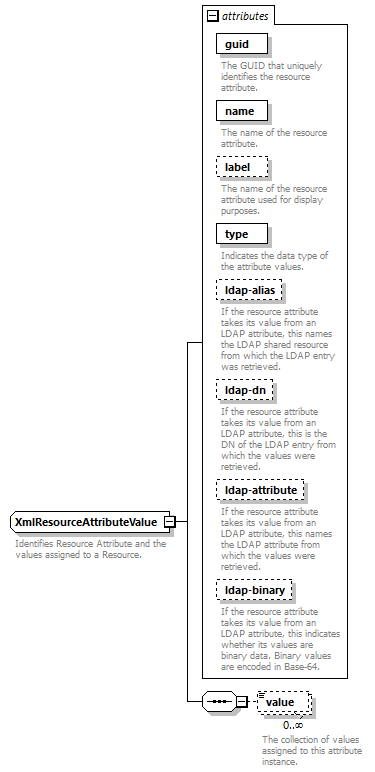| diagram |  |
||||||||||||||||||||||||||||||||||||||||||||||||||||||||||||||||||||||
| namespace | http://base.api.de.bpm.tibco.com | ||||||||||||||||||||||||||||||||||||||||||||||||||||||||||||||||||||||
| children | value | ||||||||||||||||||||||||||||||||||||||||||||||||||||||||||||||||||||||
| used by |
|
||||||||||||||||||||||||||||||||||||||||||||||||||||||||||||||||||||||
| attributes |
|
||||||||||||||||||||||||||||||||||||||||||||||||||||||||||||||||||||||
| annotation |
|
||||||||||||||||||||||||||||||||||||||||||||||||||||||||||||||||||||||
| source | <xs:complexType name="XmlResourceAttributeValue"> <xs:annotation> <xs:documentation>Identifies Resource Attribute and the values assigned to a Resource.</xs:documentation> </xs:annotation> <xs:sequence> <xs:element name="value" type="xs:string" minOccurs="0" maxOccurs="unbounded"> <xs:annotation> <xs:documentation>The collection of values assigned to this attribute instance.</xs:documentation> </xs:annotation> </xs:element> </xs:sequence> <xs:attribute name="guid" type="xs:string" use="required"> <xs:annotation> <xs:documentation>The GUID that uniquely identifies the resource attribute.</xs:documentation> </xs:annotation> </xs:attribute> <xs:attribute name="name" type="xs:string" use="required"> <xs:annotation> <xs:documentation>The name of the resource attribute.</xs:documentation> </xs:annotation> </xs:attribute> <xs:attribute name="label" type="xs:string"> <xs:annotation> <xs:documentation>The name of the resource attribute used for display purposes.</xs:documentation> </xs:annotation> </xs:attribute> <xs:attribute name="type" type="dex:XmlParameterType" use="required"> <xs:annotation> <xs:documentation>Indicates the data type of the attribute values.</xs:documentation> </xs:annotation> </xs:attribute> <xs:attribute name="ldap-alias" type="xs:string" use="optional"> <xs:annotation> <xs:documentation>If the resource attribute takes its value from an LDAP attribute, this names the LDAP shared resource from which the LDAP entry was retrieved.</xs:documentation> </xs:annotation> </xs:attribute> <xs:attribute name="ldap-dn" type="xs:string" use="optional"> <xs:annotation> <xs:documentation>If the resource attribute takes its value from an LDAP attribute, this is the DN of the LDAP entry from which the values were retrieved.</xs:documentation> </xs:annotation> </xs:attribute> <xs:attribute name="ldap-attribute" type="xs:string" use="optional"> <xs:annotation> <xs:documentation>If the resource attribute takes its value from an LDAP attribute, this names the LDAP attribute from which the values were retrieved.</xs:documentation> </xs:annotation> </xs:attribute> <xs:attribute name="ldap-binary" type="xs:boolean" use="optional"> <xs:annotation> <xs:documentation>If the resource attribute takes its value from an LDAP attribute, this indicates whether its values are binary data. Binary values are encoded in Base-64.</xs:documentation> </xs:annotation> </xs:attribute> </xs:complexType> |
attribute XmlResourceAttributeValue/@guid
| type | xs:string | ||
| properties |
|
||
| annotation |
|
||
| source | <xs:attribute name="guid" type="xs:string" use="required"> <xs:annotation> <xs:documentation>The GUID that uniquely identifies the resource attribute.</xs:documentation> </xs:annotation> </xs:attribute> |
attribute XmlResourceAttributeValue/@name
| type | xs:string | ||
| properties |
|
||
| annotation |
|
||
| source | <xs:attribute name="name" type="xs:string" use="required"> <xs:annotation> <xs:documentation>The name of the resource attribute.</xs:documentation> </xs:annotation> </xs:attribute> |
attribute XmlResourceAttributeValue/@label
| type | xs:string | ||
| annotation |
|
||
| source | <xs:attribute name="label" type="xs:string"> <xs:annotation> <xs:documentation>The name of the resource attribute used for display purposes.</xs:documentation> </xs:annotation> </xs:attribute> |
attribute XmlResourceAttributeValue/@type
| type | XmlParameterType | |||||||||||||||||||||||||||||||||
| properties |
|
|||||||||||||||||||||||||||||||||
| facets |
|
|||||||||||||||||||||||||||||||||
| annotation |
|
|||||||||||||||||||||||||||||||||
| source | <xs:attribute name="type" type="dex:XmlParameterType" use="required"> <xs:annotation> <xs:documentation>Indicates the data type of the attribute values.</xs:documentation> </xs:annotation> </xs:attribute> |
attribute XmlResourceAttributeValue/@ldap-alias
| type | xs:string | ||
| properties |
|
||
| annotation |
|
||
| source | <xs:attribute name="ldap-alias" type="xs:string" use="optional"> <xs:annotation> <xs:documentation>If the resource attribute takes its value from an LDAP attribute, this names the LDAP shared resource from which the LDAP entry was retrieved.</xs:documentation> </xs:annotation> </xs:attribute> |
attribute XmlResourceAttributeValue/@ldap-dn
| type | xs:string | ||
| properties |
|
||
| annotation |
|
||
| source | <xs:attribute name="ldap-dn" type="xs:string" use="optional"> <xs:annotation> <xs:documentation>If the resource attribute takes its value from an LDAP attribute, this is the DN of the LDAP entry from which the values were retrieved.</xs:documentation> </xs:annotation> </xs:attribute> |
attribute XmlResourceAttributeValue/@ldap-attribute
| type | xs:string | ||
| properties |
|
||
| annotation |
|
||
| source | <xs:attribute name="ldap-attribute" type="xs:string" use="optional"> <xs:annotation> <xs:documentation>If the resource attribute takes its value from an LDAP attribute, this names the LDAP attribute from which the values were retrieved.</xs:documentation> </xs:annotation> </xs:attribute> |
attribute XmlResourceAttributeValue/@ldap-binary
| type | xs:boolean | ||
| properties |
|
||
| annotation |
|
||
| source | <xs:attribute name="ldap-binary" type="xs:boolean" use="optional"> <xs:annotation> <xs:documentation>If the resource attribute takes its value from an LDAP attribute, this indicates whether its values are binary data. Binary values are encoded in Base-64.</xs:documentation> </xs:annotation> </xs:attribute> |
element XmlResourceAttributeValue/value
| diagram |  |
||||||
| type | xs:string | ||||||
| properties |
|
||||||
| annotation |
|
||||||
| source | <xs:element name="value" type="xs:string" minOccurs="0" maxOccurs="unbounded"> <xs:annotation> <xs:documentation>The collection of values assigned to this attribute instance.</xs:documentation> </xs:annotation> </xs:element> |
XML Schema documentation generated by XMLSpy Schema Editor http://www.altova.com/xmlspy